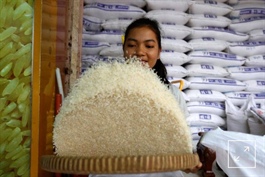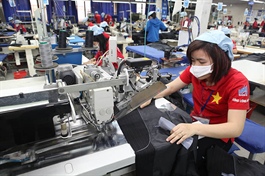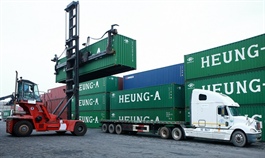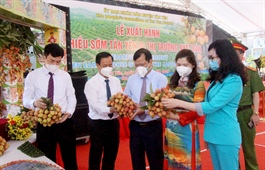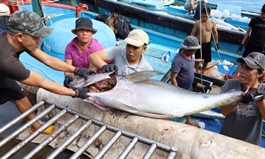HCM City sets up transshipment point at Binh Dien Wholesale Market to ensure food supply
HCM City sets up transshipment point at Binh Dien Wholesale Market to ensure food supply
The HCM City People’s Committee will open a transhipment point in one area of the Binh Dien Wholesale Market in District 8 on Tuesday to meet food and foodstuff demand. 
The market management company said the move was done to prevent speculators from taking advantage of the pandemic situation and hiking prices.
Food from the Mekong Delta region, Lam Dong Province and other provinces will be collected at the transhipment station with a supply capacity of 100-150 tonnes daily.
It will be delivered to local retail systems in the city as well as to traditional markets that have been allowed to operate during lockdown.
Each trader participating in the transhipment and distribution of goods is allowed to register five workers with the Binh Dien Wholesale Market Management Company.
However, depending on the actual situation, the company will allow traders to increase the number of workers while ensuring safety and COVID-19 measures.
Traders must also provide information about their workers, the quantity and type of goods, and information about vehicles and drivers transporting the goods.
To ensure safety, the entire market will be disinfected at least once a week and daily at transit areas.
In addition, before entering the market, traders and workers at the wholesale market must show that they have had at least one dose of COVID-19 vaccine and fill out a complete medical declaration.
On July 6, Binh Dien, the city’s largest wholesale market was closed after recording dozens of locally transmitted cases through mass COVID-19 testing. The transhipment station is located in one part of the market.
The market, when fully open, has a total of 1,880 shops with total daily trade volume of 2,200 - 3,000 tonnes and total sales of VND4-4.5 trillion a month, according to the Department of Industry and Trade.
The market imports goods from 37 provinces and cities that are transported to 19 provinces and cities nationwide. About 5,000 cars, cargo trucks and 2,000 three-wheelers enter the market every day during normal periods. The market, when fully open, has about 20,000 people working every night.








